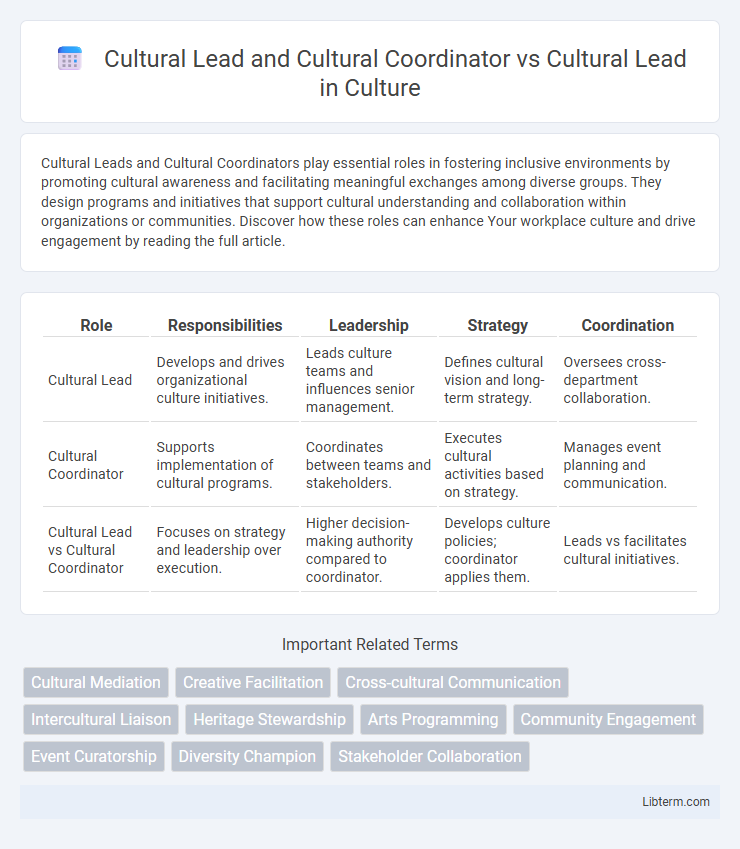Cultural Leads and Cultural Coordinators play essential roles in fostering inclusive environments by promoting cultural awareness and facilitating meaningful exchanges among diverse groups. They design programs and initiatives that support cultural understanding and collaboration within organizations or communities. Discover how these roles can enhance Your workplace culture and drive engagement by reading the full article.
Table of Comparison
| Role | Responsibilities | Leadership | Strategy | Coordination |
|---|---|---|---|---|
| Cultural Lead | Develops and drives organizational culture initiatives. | Leads culture teams and influences senior management. | Defines cultural vision and long-term strategy. | Oversees cross-department collaboration. |
| Cultural Coordinator | Supports implementation of cultural programs. | Coordinates between teams and stakeholders. | Executes cultural activities based on strategy. | Manages event planning and communication. |
| Cultural Lead vs Cultural Coordinator | Focuses on strategy and leadership over execution. | Higher decision-making authority compared to coordinator. | Develops culture policies; coordinator applies them. | Leads vs facilitates cultural initiatives. |
Introduction to Cultural Leadership Roles
Cultural Lead and Cultural Coordinator roles focus on guiding and shaping organizational culture through strategic initiatives that foster inclusivity and employee engagement. While a Cultural Lead typically drives vision, influence, and long-term cultural transformation, a Cultural Coordinator manages operational aspects, such as coordinating events and communication to support culture-building efforts. The distinction highlights leadership versus execution within cultural leadership, emphasizing the Cultural Lead's responsibility for setting culture strategy and the Coordinator's role in implementation.
Defining the Cultural Lead Position
The Cultural Lead position encompasses strategic leadership in shaping organizational culture, driving inclusivity, and fostering employee engagement aligned with core values. Unlike Cultural Coordinators who manage daily cultural activities and events, Cultural Leads focus on developing long-term cultural initiatives and influencing leadership decisions to embed cultural priorities. Defining the Cultural Lead role involves emphasizing visionary planning, cross-departmental collaboration, and metrics-driven assessment of cultural impact.
Understanding the Role of a Cultural Coordinator
A Cultural Coordinator facilitates the planning and execution of cultural events, ensuring alignment with community values and organizational goals, while a Cultural Lead oversees broader cultural strategies and team leadership. Understanding the role of a Cultural Coordinator involves recognizing their responsibility for managing event logistics, engaging diverse stakeholders, and promoting cultural awareness within the organization. This role demands strong communication skills, cultural sensitivity, and the ability to coordinate resources efficiently to foster inclusive and meaningful cultural experiences.
Key Responsibilities of a Cultural Lead
A Cultural Lead is responsible for developing and implementing strategies that promote organizational culture, fostering employee engagement, and ensuring alignment with company values to drive a positive workplace environment. Key responsibilities include leading cultural initiatives, coordinating cross-departmental communication to enhance cultural awareness, and measuring the impact of culture programs through employee feedback and performance metrics. Unlike a Cultural Coordinator who may focus on logistical support and event management, a Cultural Lead takes a strategic role in shaping and sustaining the overall culture within an organization.
Duties and Functions of a Cultural Coordinator
A Cultural Coordinator primarily manages event logistics, coordinates with artists and vendors, and ensures smooth execution of cultural programs, emphasizing operational support and community engagement. In contrast, a Cultural Lead focuses on strategic planning, vision setting, and overall cultural development within an organization or community. The duties of a Cultural Coordinator involve scheduling, resource allocation, and facilitating communication among stakeholders to promote cultural participation and inclusivity.
Cultural Lead vs. Cultural Coordinator: Core Differences
The Cultural Lead drives strategic initiatives to foster organizational culture, overseeing culture-related projects and aligning them with company values. The Cultural Coordinator supports these efforts by managing logistical aspects, facilitating communication, and organizing cultural events or programs. Core differences include the Cultural Lead's strategic leadership role versus the Cultural Coordinator's operational and administrative focus on executing culture initiatives.
Skills and Qualities Required for Each Role
Cultural Leads require strong leadership skills, cultural intelligence, and strategic planning abilities to guide organizational cultural initiatives and foster inclusive environments. Cultural Coordinators need excellent communication, event management, and interpersonal skills to effectively organize cultural programs and engage diverse communities. Both roles demand adaptability and cross-cultural sensitivity but differ in scope, with Leads focusing on vision-setting and Coordinators on implementation.
Career Pathways: Cultural Lead and Coordinator
Career pathways for Cultural Leads and Cultural Coordinators vary significantly, with Cultural Leads often advancing from coordination roles due to their strategic oversight of cultural initiatives. Cultural Coordinators focus on implementing programs and managing day-to-day operations, building essential skills in event planning, communication, and stakeholder engagement. Progression to Cultural Lead positions typically involves developing expertise in leadership, cross-cultural management, and policy development to drive organizational cultural vision.
Impact of Cultural Leadership on Organizations
Cultural Lead plays a strategic role in shaping and driving organizational culture by aligning values and behaviors with business goals, enhancing employee engagement and productivity. Cultural Coordinators focus more on implementing cultural initiatives and events, supporting the Cultural Lead's vision through operational tasks. Effective cultural leadership significantly boosts retention rates, fosters innovation, and strengthens overall organizational performance by creating a cohesive, motivated workforce.
Choosing Between Cultural Lead and Cultural Coordinator
Choosing between a Cultural Lead and a Cultural Coordinator depends on the scope of responsibilities and leadership required; a Cultural Lead typically drives strategic initiatives and oversees cultural alignment across teams, while a Cultural Coordinator focuses on executing specific cultural programs and managing event logistics. Organizations seeking long-term cultural transformation often prefer a Cultural Lead for their ability to influence organizational values and foster inclusive environments. Companies aiming for hands-on coordination and community engagement may opt for a Cultural Coordinator to ensure seamless implementation of cultural activities and employee involvement.
Cultural Lead and Cultural Coordinator Infographic

 libterm.com
libterm.com